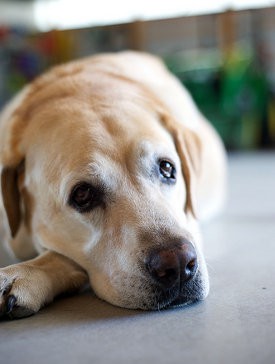|
I was 13 when our German Shepherd mix, Sheba, passed away. Duke, a white German Shepherd mix who was about a year old, had looked to Sheba as his closest companion since we brought him home at the age of 8 weeks. Suddenly his mama dog was gone. Duke became listless, ignored our attempts to cheer him up and play, and refused the food we desperately held out in our palms for him. It took 3 days before we could get him to crunch a single piece of kibble.
 Do dogs get depressed? Absolutely. Do dogs get depressed? Absolutely.
Duke exhibited many of the typical signs of depression in dogs. It followed a major life change, which can be the loss of a canine or human family member, changing homes, or a loss of attention from changes such as a new job or baby. He also showed many of the common symptoms of depression in both humans and dogs:
• Lethargy
• Loss of appetite and/or weight
• Loss of interest in things that previously brought joy
• Change in behavior and sleeping patterns
• Whining or whimpering for no apparent reason
What can be done for a dog with depression? It depends on the cause. If they’ve lost a member of their pack, there’s a certain period of time where grief is understandable and normal. If it stems from a new job or baby, find ways to give your dog special attention around the new factors in your life. If it’s from a change in scene, bring old beds or blankets to make the new environment feel more familiar.
You can also reinvigorate your dog with things he loves. For dogs that love car rides, take a short drive daily. If your dog loves playing Frisbee, try tossing the Frisbee short distances to your dog until he feels up for a full game of fetch. Whatever you do, don’t accidentally reward depressed behavior with cooing or treats. That may encourage your dog to exhibit that behavior even if he’s feeling better. Instead, reward the behavior that is normal for your dog – bringing you a toy to play with or wagging his tail when he sees a leash, for example.
If the depression persists and nothing perks up your dog, consult your vet. Just as with humans, some dogs get depressed as a result of a chemical imbalance or fluctuation. Your vet will be able to determine if the depression has a physical cause. If that’s the case, they may discuss canine anti-depressants with you or recommend other courses of action to treat the depression.
Do dogs get depressed? Yes, they are emotional beings. They may not experience it the same way as humans, and we can’t have a conversation about their feelings, but it happens. Recognizing and understanding it will allow you to help your dog out of his funk.
If you think your dog is depressed, check out our recommendations:
Kong Genius – toys that reward play and focus with hidden treats
My Dog Has Separation Anxiety – how I recognized it and what helped my dog cope with solitude
Tips For Introducing Dog To Baby – how to prepare your dog for the changes a new baby brings
Photo credit: Colin Davis
|